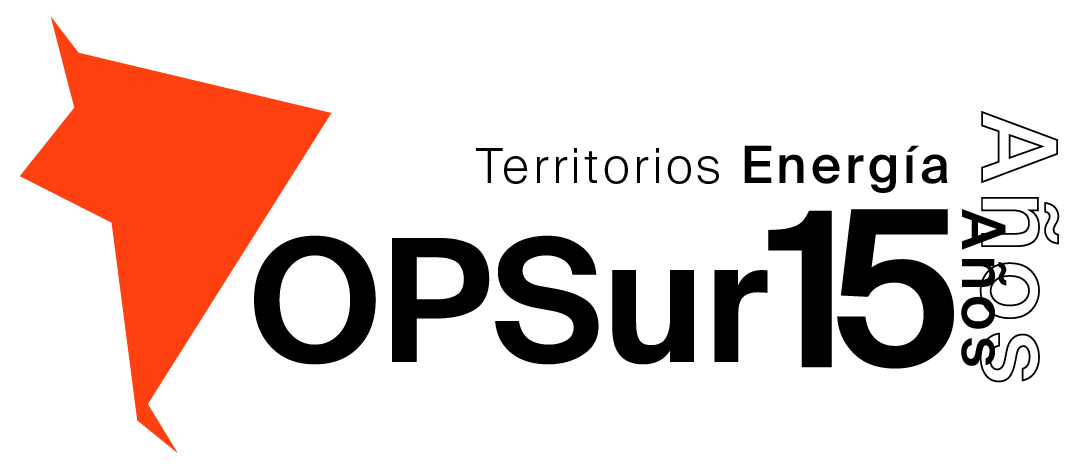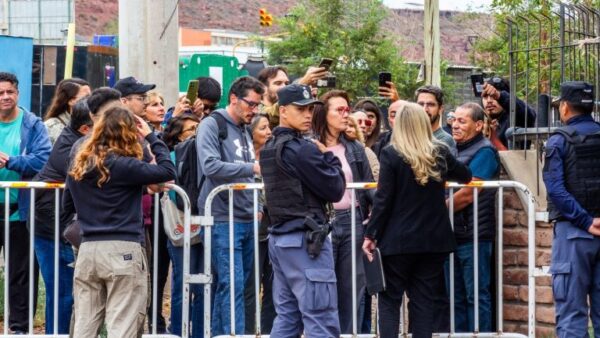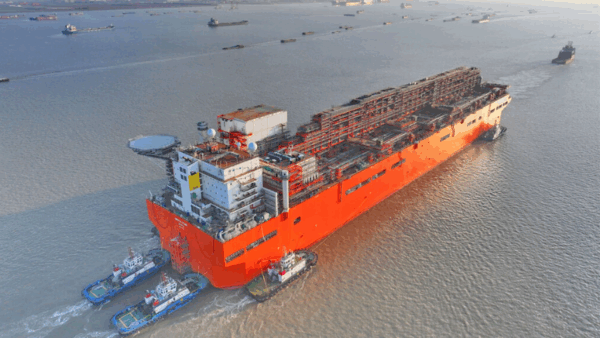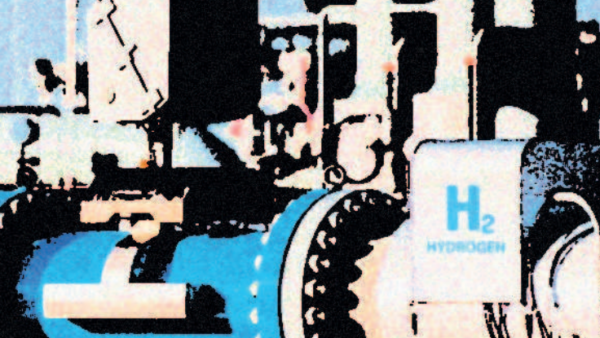Argentina will try to reverse a long decline in natural gas and oil production with the deal YPF energy company signed on Tuesday with Chevron to invest US$1.24 billion in developing the country’s shale deposits. Nevertheless, environmental groups and organizations complain about the risks of using the hydraulic fracturing technique, also known as fracking, to recover hydrocarbons.
Conventional fossil fuels have reached a limit in Argentina after 200 years of consumption and that has led to exploring new options and techniques. According to the US Energy Department, the country has the second most important reserves of unconventional gas (shale gas) and the fourth most important of unconventional oil (shale oil).
Fracking is the process of drilling down into the earth before a high-pressure water mixture is directed at the rock to release the gas or oil inside. Water, sand and chemicals are injected into the rock at high pressure which allows the gas or oil to flow out to the head of the well. The process is carried out vertically or, more commonly, by drilling horizontally to the rock layer and can create new pathways to release gas or can be used to extend existing channels.
The YPF-Chevron venture will start with a US$300 million pilot hydraulic fracturing project in a new area known as the “Enrique Mosconi Cluster,” part of the Vaca Muerta (“Dead Cow”) deposit in Neuquén province.
A second phase will require the drilling of 1,500 wells and, by the year 2017, 50 million barrels of oil and three million cubic metres of natural gas will be produced each day, making it the most productive field in Argentina, according to YPF.
“We staged a 24-hour protest to criticize the deal and oppose to the fracking technique. We wanted to send a message to the companies and the government to say we are against an initiative that will have a serious impact on our grounds,” Lefxaru Nahuel, a representative of the Mapuche community of the area, told the Herald. The indigenous communities took over four oil rigs operated by YPF after learning about the agreement between YPF and Chevron.
“Fracking is a more aggressive technique than conventional ones. A large number of trees need to be taken down, a large amount of water is required and the extraction leaves an important waste when is completed. We want YPF to do environmental studies before they start drilling,” he added.
The environmental risk
According to environmentalists, fracking uses large amounts of water that must be transported to the fracking site, at significant environmental cost. Potentially carcinogenic chemicals used may escape and contaminate groundwater around the fracking site. Environmental campaigners also say that fracking is used by firms and governments to encourage a reliance on fossil fuels.
“A large amount of wells need to be drilled, which leads to a larger space taken up by the project. Aquifers may be affected due to filtrations of the chemical water used. Companies say these are safe techniques but they don’t provide any concrete evidence,” Hernán Scandizzo, member of Observatorio Petrolero Sur, told the Herald.
Juan Carlos Villalonga, head of the Argentine green party Los Verdes, assured the Herald that “there are a lot of uncertainties related to the project” and that “there is a high risk of contaminating the groundwater reserves.”
“The large amount of money that will be spent on Vaca Muerta implies that the government plans to exploit it for a long time. This increases Argentina’s dependence on fossil fuels for the next decades, instead of having a serious and committed energy policy. The energy problems we are having now won’t change soon,” Villalonga said.
The environmental organization Greenpeace released a statement criticizing the project and the fracking technique, which “worsens global warming, delays the implementation of renewable energies and affects local communities.”
“The government continues depending on a hydrocarbons model which led to the critical energy situation we have now,” Mauro Fernández, member of the Weather and Energy campaign of Greenpeace, told the Herald.
Responding these accusations, YPF released a press report and assured that all its operations are done “taking care of the environment” and that “a remediation plan has been applied according to the province legislation.” Neuquén has approved a set of rules regarding the extraction of shale oil and gas, which “have the objective of preventing and minimizing the environmental impact,” according to the act 1483/12.
The Argentine Oil and Gas Institute (IAPG) assured that the fracking technique poses no environmental risks since “the groundwater reserves are well protected” and “the water that remains after the extraction is correctly treated.”
“This technique uses a large amount of water but there is no difference with the other energy sources which also need water. It is common to use chemicals in the hydrocarbons industry for several reasons. Nevertheless, these substances are never in contact with the environment. Also there is no link between earthquakes and shale oil and gas projects,” Ernesto López Anadón, president of IAPG, told the Herald.
Communities against
Fracking
Shale oil and gas exploration started in Argentina in 2008 in Neuquén near the Auca Mahuida reserve and indigenous communities like Gelayko . It was the first fracking project in Latin America and led to “a lot of the people living there getting sick,” according to Lefxaru Nahuel. Now the technique is being used in Río Negro, Chubut and Santa Cruz and there are also projects in Salta, Mendoza, Buenos Aires, Entre Ríos and Chaco.
Due to the environmental risk, towns of several provinces have designated themselves “free of fracking.” San Carlos district in Río Negro was the first one in Argentina in 2012 and the third one in Latin America. The same happened in Villaguay, Concepción del Uruguay, Colón and other numerous towns of Entre Ríos and Mendoza. On an international scale, France, some states of the US and the city of Quebec have also banned fracking.
“We found out about this technique because of an article written by Fidel Castro about it. Since our area was mentioned to be exploited we decided to ban it. The conventional oil and gas recovery techniques are not controlled so the same could happen with this,” José Chandía, councillor of Cinco Saltos, told the Herald.
A failed inauguration
President Cristina Fernández inaugurated last February the first well using fracking in Chubut in the area of El Trébol. Nevertheless, the project never started and neither was the well in La Greta, which was also planned in the province.
“Public hearings were held and the Water Institute of La Greta had even earmarked the water that was going to be used for the Project. Nevertheless, lawyer Silvia de los Santos filed a presentation with the court on behalf of the indigenous people and La Greta project was stopped. The well in El Trébol also didn’t start because YPF was going to bring the machinery to exploit both wells and not only one,” Cynthia García, journalist of Chubut, told the Herald.
Buenos Aires Herald
Fracking is the process of drilling down into the earth before a high-pressure water mixture is directed at the rock to release the gas or oil inside. Water, sand and chemicals are injected into the rock at high pressure which allows the gas or oil to flow out to the head of the well. The process is carried out vertically or, more commonly, by drilling horizontally to the rock layer and can create new pathways to release gas or can be used to extend existing channels.
The YPF-Chevron venture will start with a US$300 million pilot hydraulic fracturing project in a new area known as the “Enrique Mosconi Cluster,” part of the Vaca Muerta (“Dead Cow”) deposit in Neuquén province.
A second phase will require the drilling of 1,500 wells and, by the year 2017, 50 million barrels of oil and three million cubic metres of natural gas will be produced each day, making it the most productive field in Argentina, according to YPF.
“We staged a 24-hour protest to criticize the deal and oppose to the fracking technique. We wanted to send a message to the companies and the government to say we are against an initiative that will have a serious impact on our grounds,” Lefxaru Nahuel, a representative of the Mapuche community of the area, told the Herald. The indigenous communities took over four oil rigs operated by YPF after learning about the agreement between YPF and Chevron.
“Fracking is a more aggressive technique than conventional ones. A large number of trees need to be taken down, a large amount of water is required and the extraction leaves an important waste when is completed. We want YPF to do environmental studies before they start drilling,” he added.
The environmental risk
According to environmentalists, fracking uses large amounts of water that must be transported to the fracking site, at significant environmental cost. Potentially carcinogenic chemicals used may escape and contaminate groundwater around the fracking site. Environmental campaigners also say that fracking is used by firms and governments to encourage a reliance on fossil fuels.
“A large amount of wells need to be drilled, which leads to a larger space taken up by the project. Aquifers may be affected due to filtrations of the chemical water used. Companies say these are safe techniques but they don’t provide any concrete evidence,” Hernán Scandizzo, member of Observatorio Petrolero Sur, told the Herald.
Juan Carlos Villalonga, head of the Argentine green party Los Verdes, assured the Herald that “there are a lot of uncertainties related to the project” and that “there is a high risk of contaminating the groundwater reserves.”
“The large amount of money that will be spent on Vaca Muerta implies that the government plans to exploit it for a long time. This increases Argentina’s dependence on fossil fuels for the next decades, instead of having a serious and committed energy policy. The energy problems we are having now won’t change soon,” Villalonga said.
The environmental organization Greenpeace released a statement criticizing the project and the fracking technique, which “worsens global warming, delays the implementation of renewable energies and affects local communities.”
“The government continues depending on a hydrocarbons model which led to the critical energy situation we have now,” Mauro Fernández, member of the Weather and Energy campaign of Greenpeace, told the Herald.
Responding these accusations, YPF released a press report and assured that all its operations are done “taking care of the environment” and that “a remediation plan has been applied according to the province legislation.” Neuquén has approved a set of rules regarding the extraction of shale oil and gas, which “have the objective of preventing and minimizing the environmental impact,” according to the act 1483/12.
The Argentine Oil and Gas Institute (IAPG) assured that the fracking technique poses no environmental risks since “the groundwater reserves are well protected” and “the water that remains after the extraction is correctly treated.”
“This technique uses a large amount of water but there is no difference with the other energy sources which also need water. It is common to use chemicals in the hydrocarbons industry for several reasons. Nevertheless, these substances are never in contact with the environment. Also there is no link between earthquakes and shale oil and gas projects,” Ernesto López Anadón, president of IAPG, told the Herald.
Communities against
Fracking
Shale oil and gas exploration started in Argentina in 2008 in Neuquén near the Auca Mahuida reserve and indigenous communities like Gelayko . It was the first fracking project in Latin America and led to “a lot of the people living there getting sick,” according to Lefxaru Nahuel. Now the technique is being used in Río Negro, Chubut and Santa Cruz and there are also projects in Salta, Mendoza, Buenos Aires, Entre Ríos and Chaco.
Due to the environmental risk, towns of several provinces have designated themselves “free of fracking.” San Carlos district in Río Negro was the first one in Argentina in 2012 and the third one in Latin America. The same happened in Villaguay, Concepción del Uruguay, Colón and other numerous towns of Entre Ríos and Mendoza. On an international scale, France, some states of the US and the city of Quebec have also banned fracking.
“We found out about this technique because of an article written by Fidel Castro about it. Since our area was mentioned to be exploited we decided to ban it. The conventional oil and gas recovery techniques are not controlled so the same could happen with this,” José Chandía, councillor of Cinco Saltos, told the Herald.
A failed inauguration
President Cristina Fernández inaugurated last February the first well using fracking in Chubut in the area of El Trébol. Nevertheless, the project never started and neither was the well in La Greta, which was also planned in the province.
“Public hearings were held and the Water Institute of La Greta had even earmarked the water that was going to be used for the Project. Nevertheless, lawyer Silvia de los Santos filed a presentation with the court on behalf of the indigenous people and La Greta project was stopped. The well in El Trébol also didn’t start because YPF was going to bring the machinery to exploit both wells and not only one,” Cynthia García, journalist of Chubut, told the Herald.
Buenos Aires Herald




